Escape from Agitprop
Kira. By Victor Nekrassov. Translated by Moura Budberg. (Cresset, 16s.)
No sooner has this short novel appeared in England than its author finds himself in trouble in Moscotv. He has just been denounced by Mr. Khrushchev, who has probably not read Kira, but has had his attention drawn to a more recent work of Nekrassov's—the travel notes which he published about his visits to Italy and the US. Here he pokes fun at some of the stuffier Soviet habits, such as shepherding their tourists round in droves in the custody of special officials, Of one such official Nekrassov wrote:
He made a short speech about discipline, about the tasks and duties of a small Soviet collective on foreign soil, about how some of us had been late for dinner on the first day, had become detached from the collective and had to come on later by taxi, and how this mustn't happen again or he would be forced to take appropriate measures.
Considering the absurdity of what he was de- scribing, Nekrassov spoke gently. All the same, he has been rebuked for 'bourgeois objectivism' (saying what he really thought) and for present- ing the United States as a place where it is not more unpleasant to live than in Russia.
Nekrassov is not a disaffected Soviet citizen. He wants to humanise the system, not dismantle it. But he is sufficiently out of tune with official policies to have kept his novel Kira free, from the -most glaring fault of the typical Soviet Socialist Realist novel—the insistence on making strident political claims.
This is not at all a piece of advertising copy in favour of the Soviet system, but a description of private life in the Soviet Union. The heroine, Kira, is an attractive woman of about forty, a sculptress. She is married to a man twenty years older than herself, and is haVing an affair with a man twenty years younger than herself. In the middle of all this, her former husband, Who is of about her own age, suddenly returns from Siberia after many years in the camps. Kira, who juggles adroitly with these three men, is a detailed portrait of a thoughtless, lighthearted, egotistical woman. And, as even this brief resume may in- dicate, Nekrassov has chosen to put her in a situation full of possibilities.
What a pity that, in jettisoning the element of political affirmation (once an essential and still an all-too-common element in Soviet fic- tion), Nekrassov was not able at the same time to shake himself free from another traditional failing of Soviet fiction. He has preserved much too much of the dull, static, solemn, flat, slack, humourless tone which has never been imposed on Soviet writers by administrative decree, but which has somehow become an accepted con- vention in their writing all the same.
If only Soviet authors could learn to write narrative which carries the reader from one place to another. (A few of them have learnt,' but Nekrassov is not one.) As it is, their works so often seem to face the past. It is no accident that a great deal of Kira has been translated in the pluperfect tense, and rightly so if it is a trans- lator's duty to reflect faithfully the dullness of his original.
Nekrassov is a gifted man who would cer- tainly write better in a society where authors have to compete for readers. The reasons why a book gets published in Russia have little to do with whether anyone wants to read it or not, as a result of which the Soviet novelist's fault is laziness, whereas the Western novelist's fault is over-sensationalism. We try too hard to make an impression, while they do not try hard enough.
There is also the point that our novelists are paid by what they sell, whereas theirs are usually paid by the number of words—hence the innumerable flashbacks (which could in fact be interchanged between one novel and another without anyone noticing anything amiss) about
what someone's grandfather was doing in 1905. Nekrassov himself does use the flashback tech- nique too much, but he is too good a writer to employ flashbacks as mere padding. He is at least halfway out of the dreary trough in which most Soviet novelists wallow—but why, oh whY, could he not hoist himself out completely? So much for the book as a novel. What about its value as a document? It is in this that US
chief interest for English readers will lie. It gives an entertaining enough picture of the rife, of the Soviet artistic elite, who have plenty of
money and can come and', go more or less a3 they please. On the concentration camps it i5 not so revealing (though it is full of allusions to them) for it was written in the pre-SolzhenitsYn days when fictional references to the camps had to be vague and dreamlike. With all its mild faults and mild virtues, this novel was well worth bringing out here. It Pots before the English reader a typical specimen of the kind of politically neutral literature which has flourished in Russia during the last fed' years, and which—if present signs of hardening official policy are anything to go by—is now going to be much more difficult to publish. RONALD H INGI°














































 Previous page
Previous page